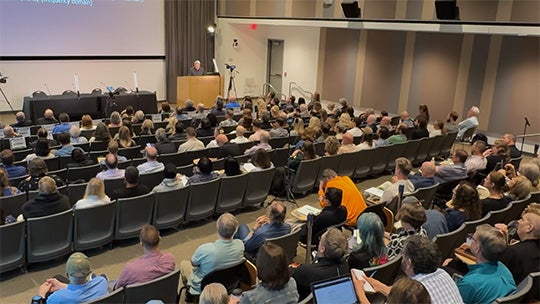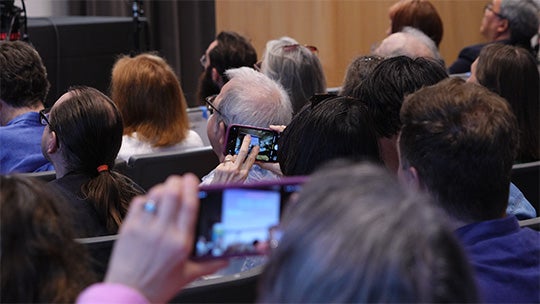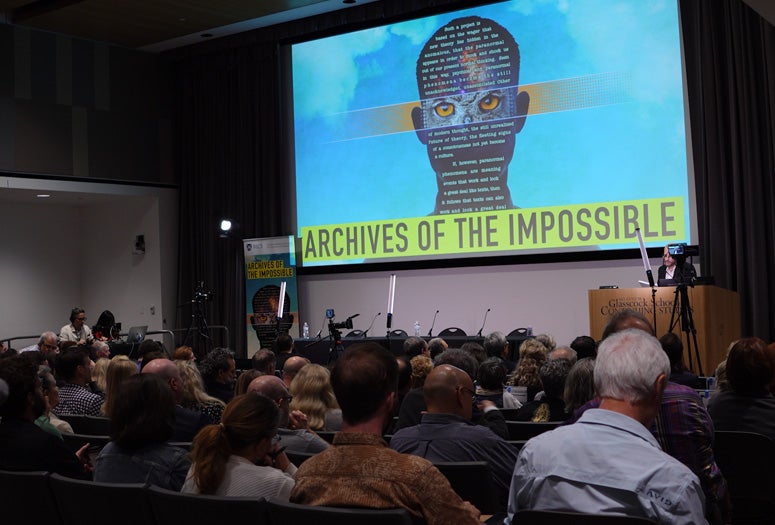The 2025 Archives of the Impossible (AOTI) conference at Rice University took aim at a question once confined to the fringes of scientific and religious thought: What does it mean that credible witnesses are now speaking openly about unidentified anomalous phenomena, or UAPs?
For three days in April, scholars, experiencers and independent researchers gathered not to solve the mystery but to examine its place in our evolving cultural, political and philosophical landscape. What emerged was a vision of inquiry unbounded by academic discipline or public stigma, grounded instead in open conversation and intellectual courage.
“People came ready to talk,” said Jeffrey J. Kripal, the J. Newton Rayzor Chair in Philosophy and Religious Thought, who convened the conference with the Harry and Hazel Chavanne Professor of Religion William B. Parsons, AOTI project manager Karin Austin and University of North Carolina Wilmington religion professor Diana Pasulka.

This year’s conference marked the third installment in the AOTI series and the most pointedly focused on the UFO/UAP phenomenon to date. Participants explored the role of government disclosure, the experiences of those who claim contact with nonhuman intelligences and how these accounts intersect with religion, consciousness and humanity’s deepest questions.
“The UFO is a wedge into these other issues, and it’s what the political culture and the military culture and the popular culture really is thinking about,” Kripal said. “It’s not that the archives or myself are totally dedicated to the UFO. They’re not, and I’m not, but it’s a really good way to have the conversation.”
From the beginning, AOTI as a project has been built not on dogma or belief but on documentation, dialogue and trust. Its genesis was the donation of researcher Jacques Vallée’s materials to Woodson Research Center — a moment that for Kripal signaled the start of something enduring. Vallée, an astronomer and computer scientist whose career bridged science and the unexplained, helped inspire the film “Close Encounters of the Third Kind.”
“People see how serious it is and that it’s a real conversation,” Kripal said. “Jacques really believes in the physical archives because he’s had so much experience with the government and military intelligence community, which essentially cuts up the topic into classified areas and prevents research advancement. He wants his material to enhance research.”

Today, the AOTI collection at Rice includes 18 archival contributions, among them the records of physicist Ed May, writer Whitley Strieber and Harvard psychiatrist John E. Mack, whose 150-box donation spans decades of interviews with people describing abduction experiences. The conference provides an intellectual counterpart to that physical archive.
“We don’t take a position or a conclusion or a conviction; it’s really a conversation,” Kripal said. “I think people really see that and understand that and appreciate that.”
The credibility of the conversation has shifted in step with global developments. A once-marginalized topic has entered political hearings, national headlines and official statements from the military and intelligence communities. What was once the stuff of science fiction is now increasingly a subject of congressional briefings and defense analysis.
“For me, it’s a kind of ‘I told you so moment’ to be really honest, because a lot of us saw that it was a very serious thing decades ago,” Kripal said.
If the subject matter sounds otherworldly, the tone of the conference was anything but. Rather than treat the UFO as an anomaly, the AOTI conference treated it as an aperture — an entry point into questions of human perception, belief, memory and the limits of institutional knowledge.
“This is a conference that’s being discussed at a major research university, and that means a lot," Kripal said.

The legitimacy of the topic is reflected not only in its venue but in its range of participants. Attendees included astronomers, anthropologists, philosophers and military historians. Some came to question. Some came to testify. All came to listen.
“I don’t think we can get at this topic through one discipline or one department or one school,” Kripal said. “We really need the whole shebang. Even then, I doubt we can understand it, to be really honest. That’s, of course, its power. That’s what an intellectual loves. Intellectuals love something that cannot be understood with the present categories or frameworks.”
For Kripal and his co-conveners, the future of the AOTI project lies not only in the growing archive or biannual conference but in cultivating a durable community of thinkers committed to exploring the edges of experience with rigor and respect.
“What I really want to see come next is, frankly, some center, some material base to this conversation that can carry on well after I’m gone and we’re all gone,” Kripal said. “It’s a multigenerational inquiry for me. It’s not a one-off."

